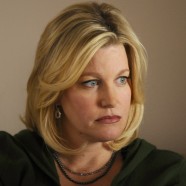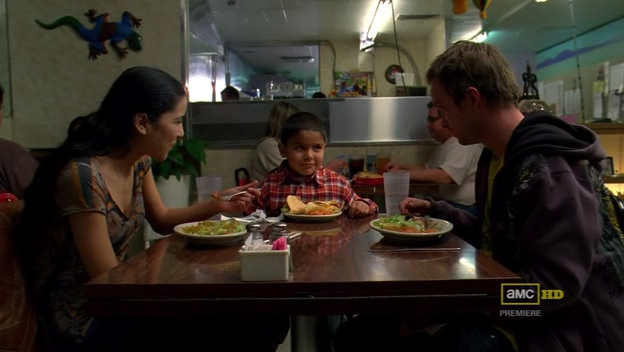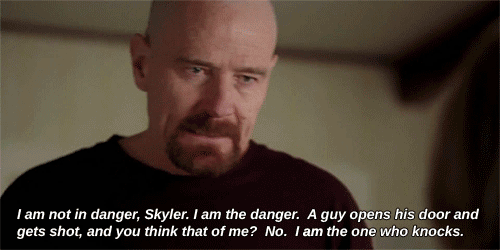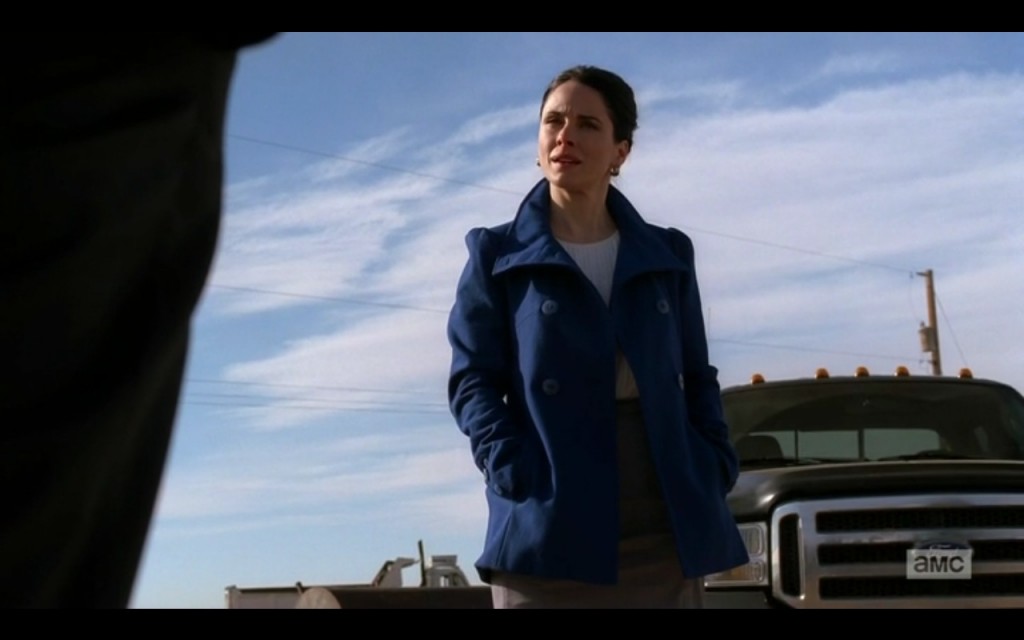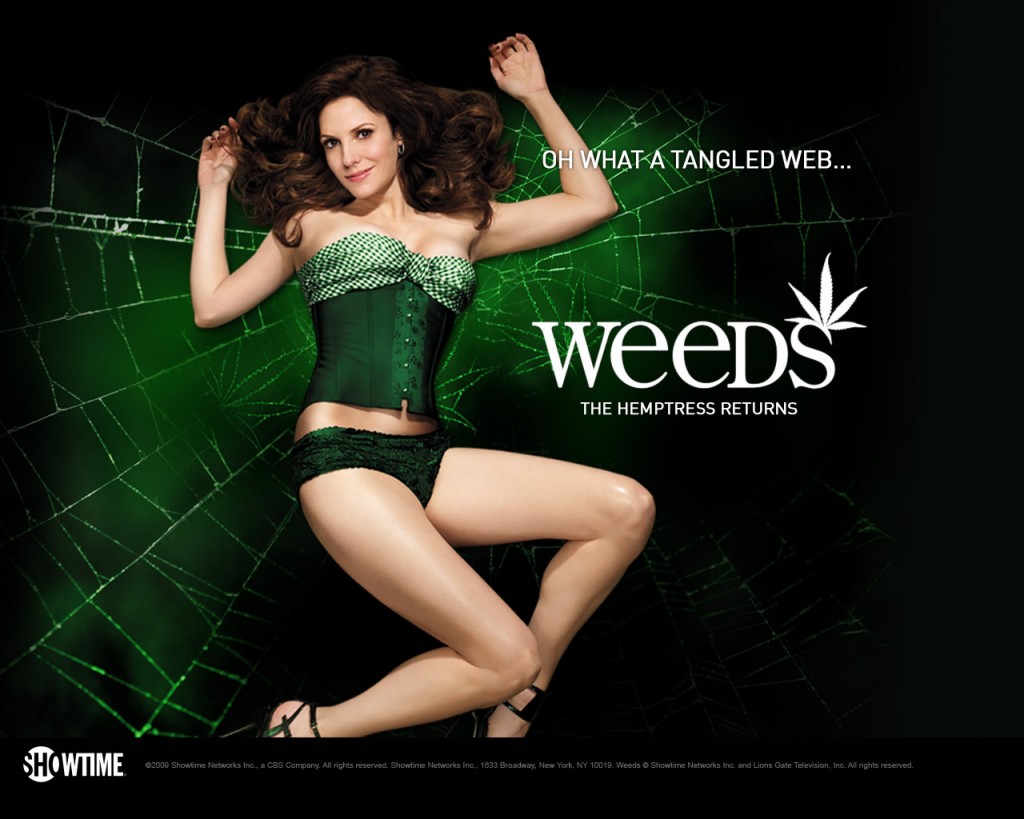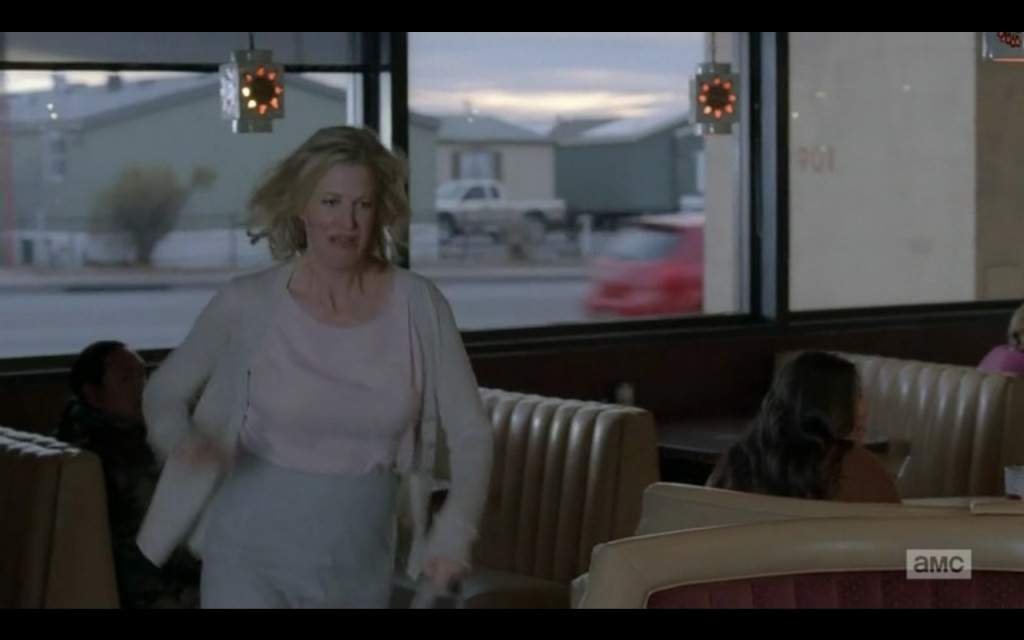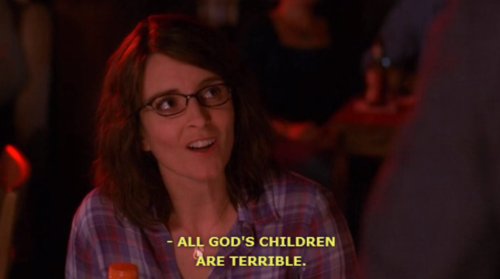Breaking Bad: Skyler-hate
I’m late to the party on this one! Actor Anna Gunn wrote a New York Times Op-Ed about the hatred her Breaking Bad character, Skyler White, has received from fans of the show. The piece, I have a character problem, has been widely discussed in the last week or so.
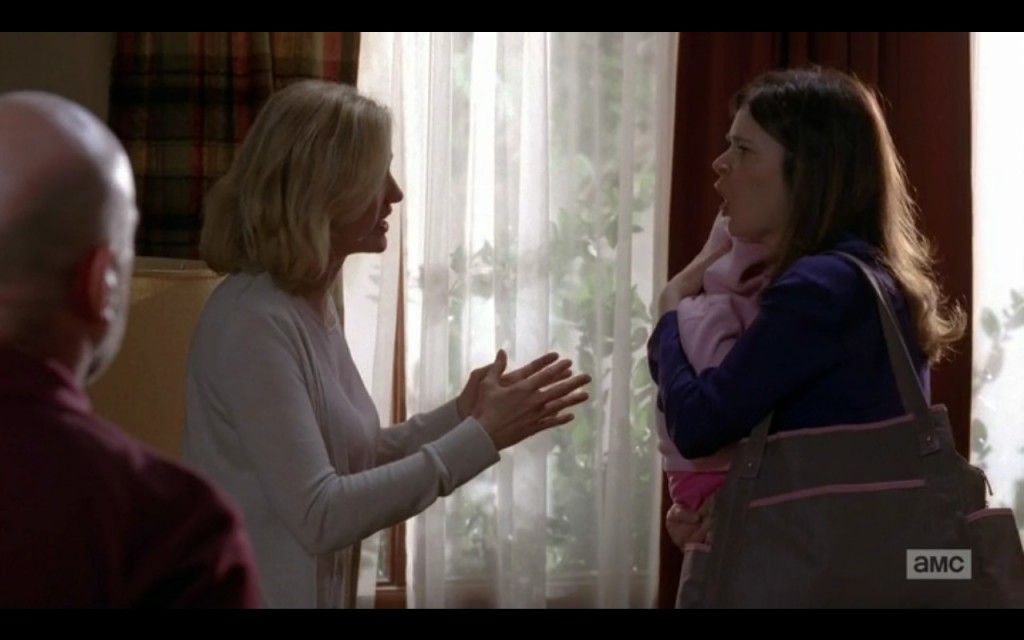
Marie: No, Skyler, you can’t have your baby! Haven’t you heard the terrible things people are saying about you on the internet?
In admirably brief fashion (I have a lot to learn!), she describes some of the internet vitriol that’s come her way. She says at first she attributed Skyler-hate to the fact that Walter White is the protagonist of the show. Because Walter is so skillfully written and acted, the audience roots for Walter, even when he does increasingly awful things. (And even as we start to hate him, we still love to hate him, if that makes sense). Gunn says:
As the one character who consistently opposes Walter and calls him on his lies, Skyler is, in a sense, his antagonist. So from the beginning, I was aware that she might not be the show’s most popular character.
But she also wonders if the fact that Skyler is strong and smart and doesn’t back down might have something to do with it. And as the show has revealed over time, Skyler is not so different from Walter; she’s can be ruthless and make morally compromised decisions, too:
Vince Gilligan, the creator of “Breaking Bad,” wanted Skyler to be a woman with a backbone of steel who would stand up to whatever came her way, who wouldn’t just collapse in the corner or wring her hands in despair. He and the show’s writers made Skyler multilayered and, in her own way, morally compromised.
For me, I think Skyler’s character can be summed up by the moment when she told Walter that if the truth about his drug-dealing came out, she’d rather go down as being in on it than thought of as the stupid wife who didn’t know what was going on. Though she’s since waffled and expressed disgust for Walter, I think that moment probably encapsulates some essence of her character. She’s not necessarily a great person, but she’s very smart, and she also desperately wants to be seen as smart (much like Walter; they are more alike than they initially appear, I think).
But even though her character is rather similar to Walter in some ways, Gunn is right that her character isn’t held to the same standards. Due to her role as “antagonist” (squasher of fun), and indubitably because she is a woman, her character has come into some rough treatment:
A typical online post complained that Skyler was a “shrieking, hypocritical harpy” and didn’t “deserve the great life she has.”
“I have never hated a TV-show character as much as I hate her,” one poster wrote. The consensus among the haters was clear: Skyler was a ball-and-chain, a drag, a shrew, an “annoying bitch wife.”
…As an actress, I realize that viewers are entitled to have whatever feelings they want about the characters they watch. But as a human being, I’m concerned that so many people react to Skyler with such venom. Could it be that they can’t stand a woman who won’t suffer silently or “stand by her man”?
She also points out that other female characters in critically-acclaimed shows about male-anti-heroes–like The Sopranos and Mad Men–have come in for similar venom.
Disturbingly, she notes that the hatred of the character has bled into hatred for her, as a person and as an actor, which is scary but not uncommon.
Thoughts! I have so many of them!
Ahem:
1. I don’t think you can let the writing of the show off the hook entirely for this one.
First off, there is no way I can overstate my appreciation for the writing on Breaking Bad. It’s amazing. It’s blackly funny, well-paced, full of nuance, and every other superlative piece of praise that has been and will be applied to it. The show is addictive and engaging to an almost scary degree. But there’s no denying that the creator of the show is a man, that the majority (though certainly not all) of the writers on the show are men, that most of the characters of the show are men, and that television is, historically and in general, a male-dominated business.
This is not to level some blanket accusation of sexism again the creators of the show or the show itself. I don’t think that’s the case at all. But I do think of it as a “male show,” in many significant ways. Which is, in and of itself, absolutely fine. People are allowed to write shows that are largely about male characters. And, in point of fact, I do think Skyler and Marie have been well-written and portrayed. But Skyler and Marie aren’t the protagonists of the show, and their point of view, while given sensitive time and space, isn’t the dominant perspective. Nor do we have a lot of shows where people like Skyler and Marie are the dominant perspective.
The show has also fallen into well-worn gender traps a little bit. For example, Jesse’s relationship seems to show feminine/family characters as some kind of idealized sphere of domesticity that will “save” the man. The show didn’t do that with Jesse’s first girlfriend, Jane, but his other love interest, Andrea, has only been tangentially presented and never developed as a real character.
Sure, she’s an addict, but we haven’t seen her do anything unsympathetic as such. Instead, she and her child, Brock, are largely angelic–her kid smiles and is polite; they accept Jesse’s money and make a nice home without a peep; they are some kind of perfect, video-game-playing oasis for Jesse.
And harm to this domestic unit is presented as the unforgivable line that Walt crosses for Jesse–the “perfect domestic” (i.e., passive and feminine) life that Jesse had to give up for Walt (for the dangerous, but active, male life). That whole sub-plot irritated me precisely because Skyler and Marie had been given a bit more depth. Sure, Skyler for Walt and Marie for Hank represent a domestic life that the men want to protect and provide for, but each woman, and each domestic life, is far from perfect; Skyler and Marie both have strengths and flaws–i.e., they seem like real people, rather than idealized “little women” tending the home fires.
All of this is to say: I think, in general, the writing for Marie and Skyler has been very good (and the performances have been flat-out amazing), but there’s no denying that the POV of the show is largely male and most of the characters of male. And not all of the presentation of gender relations has been stellar. The show does tend a little bit towards presenting female characters as either a salvation from (Andrea) or a hindrance to (Skyler) the world of male power.
Plus, Breaking Bad, as Gunn tangentially points out, fits into a certain contemporary television tradition of the male anti-hero, led by The Sopranos and Mad Men. We’ve got our deeply flawed male protagonist, who fucks up, but is so smart, nuanced, charismatic and complex that we can’t help but root for him. Plus, these shows are largely about the male-dominated sphere in which the male protagonist operates: the Mafia, 1960s advertising, and meth dealing in the case of the three shows mentioned. So the male character is active and has active goals that we can see and sympathize with. The shows go to a lot of efforts to help us understand and navigate these male goals.
(I found this following image from the article “The Difficult Men Who Made Great TV” — the fact that it was no difficulty at all to find images and articles comparing the three says something):
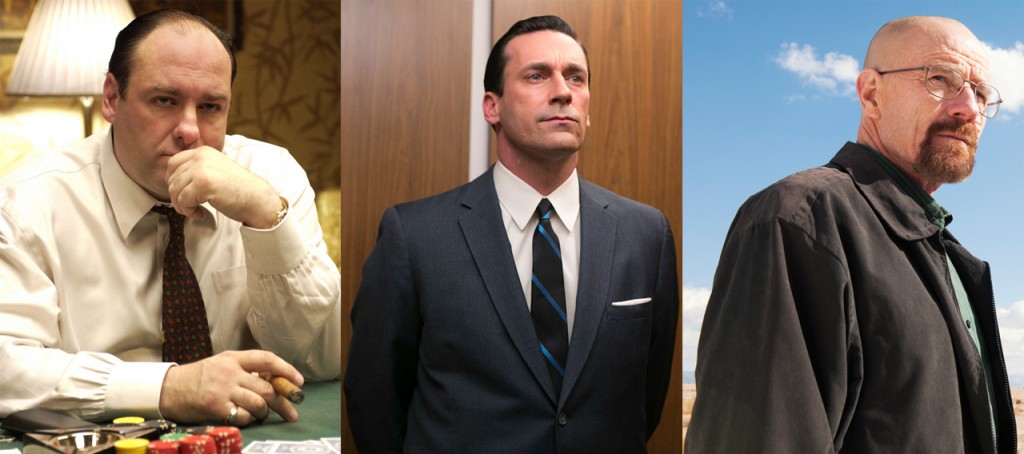
James Gandolfini as Tony Soprano in HBO’s “The Sopranos” (Abbot Genser/HBO via AP), Jon Hamm as Don Draper in AMC’s “Mad Men” (Jordin Althaus/AMC via AP), Bryan Cranston as Walter White in AMC’s “Breaking Bad” (Frank Ockenfels/AMC via AP).
Meanwhile, the female characters are by necessity either supporting or blocking the male character’s efforts and don’t have quite the same central role in the male world. They are reactive to the things the male characters do, and don’t always have their own independent goals and worlds. So is it any surprise, that even with excellent writing and acting, the female characters often seem less sympathetic, less fun, and less relatable than the male characters? Skyler doesn’t get those moments when there’s a montage of her making meth to awesome music; she doesn’t get to say “I am the one who knocks” or to tell a rival drug-dealer, “Say my name.” As immoral as Walt has grown to be, he gets to be active and kick-ass. Skyler gets to be reactive to Walt.
All of this is a long way of saying that Gunn might politely attribute the negativity directed at Skyler as a “Rorschach test” of how people feel about gender, but the truth is, if women had been allowed a different and more active kind of role in Breaking Bad–which, to be fair, would involve upending not only the current traditional structures of TV but hundreds of years of history and writing and social structures of all kinds–that negativity might not have been there in the first place.
I like the character of Lydia in Season Five, because for the first time we get a female “player,” rather than a girlfriend or wife to a male player. Nevertheless, she’s still far from being an “enjoyable bad-ass” (maybe she’ll get there).
You can’t just blame the audience for a negative reaction, is what I’m trying to say. I’ve been a fan of other TV shows where fans have directed negativity against female characters, and the writers have often thrown up their hands in despair, blaming the “crazy fans”. And while I certainly don’t condone threats or “hate forums” at all, sometimes I think television writers are too quick to attribute this hate to the audience entirely, rather than looking at how what they’ve created has fed into that negativity.
It isn’t that viewers “just don’t like” women, although sexist attitudes certainly come into play. It’s that viewers will naturally sympathize with the characters that are given the most agency and the most nuance. When characters serve largely as a “blocking function” or when they are only tangentially related to the active world of most of the show, they will inevitably be less liked. And, again almost inevitably, female characters who have less of an active role and whose point of view is not as fully explored, will be harder to root for. This is the case even in a show like Breaking Bad, which employs stellar female actors and whose scripts are so clever and well-done.
Television viewers are ruthlessly amoral in many ways. They don’t root for the “best” character–they root for the character that is the most kick-ass (hence, the popularity of so many villain characters). Walter White has grown to be morally awful, but he’s scheming and active and ambitious. He has goals and plans and he tries to see them through. Often, he does clever and kick-ass things to achieve his goals. Meanwhile, Skyler has to react to what is going on with Walt. Skyler’s goals and ambitions are largely confined to bouncing off or reacting to Walt’s current situation.
What does Skyler want? We know she wanted to be a writer at some point. Has her ambition curdled into resentment the way Walt’s has? How did she see her life working out? What she’s ultimately trying to do? We’ve yet to see her engage in a situation that isn’t a reaction to Walt or some other man in her life. Her dilemma is often one of What am I going to do about Walt? Do I block him or support him? How am I going to be in relation to him? What relation to Walt will serve me the best?
Inevitably, that’s less interesting and the audience–male and female–comes to resent it.
2. However, there’s no denying a certain basic sexism in the way that viewers respond to TV.
Let’s not let the audience off the hook entirely, either.
I watch a lot of television shows that are seen as “female” shows, and, perhaps as a fucked-up result, I often feel embarrassed admitting how much I enjoy them. On the flip side, it’s harder for me to engage with “male” shows; I’m honesty a bit sick of the “tortured male anti-hero” model and I tend to give shows like that a pass, even though they’re the ones that win the most awards and get the most cultural attention. Breaking Bad is the exception to that rule, and I have to confess that it’s been sort of nice (in a fucked-up way) to finally have a “serious” and “male” show I can talk about liking. It’s like I get to participate in some of kind cultural male cachet that I haven’t been able to before.
Breaking Bad invites you to indulge in the dark side of the male lust for power, to “go all the way” with Walt on his dark journey towards “empire building.” And that journey largely involves ignoring or manipulating or riding rough-shod over the (few) female characters who do not have as large of a role to play in that kind of world.
Breaking Bad doesn’t invite you to take Skyler’s journey in the same kind of way. We see her character’s point of view, but it’s not darkly thrilling, for all the reasons I listed above: her journey is less active and just less “fun.” (This is not to say that the show is uncritical of Walt: on the contrary, it’s very critical. But the truth is, Walt’s journey–tragic and fucked up as it is–is still a powerful, fun ride).
These reactions do come from the writing, but it’s important to say that we’re also primed for them as people that live in the culture we do. Audiences are much more resistant to female anti-heroes, for a variety of reasons.
It’s much harder–though certainly not impossible–to base a show around a female that lusts for individual power or accomplishment because female are still largely socialized to be relational–to see their identity in how they respond to other people. Thus, we rarely see female characters consumed with power or with accomplishing a goal–even if they oestibly start out that way, the shows often end up focusing on that female’s relationships, particularly with men.
For example, Nancy Botwin of Weeds is female drug-dealer, but she’s not exactly the female Walter White. She’s not consumed with ambition and her reasons for going into the drug trade always remained opaque. The show ended up focusing a great deal on her sexual and romantic relationships with men; her forays into drug-dealing always came down to relationships. This is not to hate on Weeds or a focus on relationships (I like both), but just to say that female characters are rarely driven in the darkly consuming, goal-oriented way that male characters are. It’s also worth noting that Nancy and her actor-portrayer, Mary Louise Parker, came in for a great deal of Internet hate, too.
3. Which relates to this: there’s also still great pressure on women–and female characters–to be “likeable” and “nice.”
Female characters that aren’t likeable and nice are castigated and despised, while male characters are allowed to be awful–and still be fascinating and enjoyable to watch as characters. We can love to hate male characters much more easily–or perhaps, people are more willing to deeply love and invest in flawed males characters. Women who aren’t “likeable” have a harder time of it.
Part of what puzzles me over the “Skyler hate,” is the simple fact that, duh, you’re not supposed to love Skyler. She…isn’t particularly likeable. Because I don’t think any of the characters on the show are particularly likeable. They are certainly all deeply fucked up, and I wouldn’t want to be friends with any of them. I wouldn’t want to have dinner with any of them. But nevertheless, they’re complex and fascinating to watch.
Somehow, that’s okay when it’s Walter–again, I think it comes down the fact that he gets to be more active and kick-ass, and also that we give men room not to be likeable. We celebrate it in men, actually (calling a guy “nice” isn’t exactly a compliment, screwed up as that is). But we’re much harsher on women that are portrayed as being deeply flawed.
I can think of several shows with flawed female protagonists who have come in for a lot of vitriol, and in those cases I’ve often heard the writers and actors sigh that hey! this character isn’t supposed to be likeable! Yes, she’s flawed! That’s the whole point! We’re aware that the things she does aren’t so great!
Somehow, that just doesn’t fly as easily when it’s a female character. I’ve never heard of a similar problem with a male character. A male character’s flaws and quirks are often celebrated, even if they’re destructive (womanizing, substance abuse, violence, etc). Again, I think women are still expected to be relational: they’re supposed to nice and positive and charming and supportive of the other people in their lives. When they’re selfish and flawed or not-nice to people in their lives, watch out for the wrath that comes their way.
In conclusion…for me, I always think of the Community episode where Abed explains that everybody hates the one female Inspector on Inspector SpaceTime but “not because they’re sexist, because she sucks.” (Note: apparently, you’re not supposed to like this episode? I thought season four of Community lacking, but I found this episode a complete gem. Hummmmph).
“It’s not because they’re sexist, it’s because she sucks,” I think encapsulates this long ramble of a post:
- Frankly, female characters often do “suck,” simply because of the way that they’re written (hello, male-dominated POV).
- We’re socialized to identify with that male POV and to value men as individuals, while we value women in terms of how they relate to others.
- Audiences are waaaaaay less tolerant of “sucky” traits in female characters…and often refuse to see that there might be underlying sexism in that.
It should be okay for a female character to be unlikeable, as long as she’s complicated and we are interested in her and find her active and engaging.
She can still be terrible. In words of a great female character, Liz Lemon:

